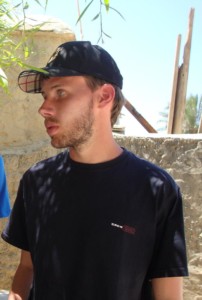
Hans Van Eyghen is a PHD-candidate at the department of philosophy at the Free University of Amsterdam. He is part of the Abraham Kuyper Center for Science and the Big Questions and his research is on the philosophical implications of the cognitive science of religion and more precisely on how cognitive scientists try to explain religious belief on a naturalistic basis.
In this week's podcast, Hans Van Eyghen sits down with Professor Michael Pye to discuss the various historical, political, and social factors that have impacted Japanese Shinto. Though Shinto is widely known as the indigenous religion of Japan, it is rarely discussed in detail and has attracted little attention from scholars. In this week's podcast,
What does math have to do with religion? In his interview with Hans van Eyghen, author Chris Ransford discusses his latest book 'God and the Mathematics of Infinity'. He discusses why mathematics is useful for thinking about religion, covering some of the conclusions he draws in the book.You can download this interview, and subscribe to receive our weekly podcast,If you enjoyed it, please take a moment to rate us. And remember,...
Cognitive Science of Religion has sometimes been criticized for lack of empirical support. Jonathan Jong went as far as claiming that some theories are ‘notoriously under-determined by data’.
Visiting your Alma Mater is always accompanied by mixed emotions. On the one hand you see familiar things you missed but on the other hand you’re confronted with downsides you hoped were a thing of the past. My visit to the KULeuven for the EASR conference had both, although the positives far outweighed the downsides.
In her interview, Mirjam Mencej discusses her fascinating research into witchcraft in rural Slovenia. She conducted field work in Eastern Slovenia into people’s beliefs on witchcraft. Though restricted to rural areas in Eastern Slovenia, she claims belief in witchcraft is very much alive.
Claiming that social deficit increases religious belief is also hard without presupposing that some belief was already there. Compensating lack of social interactions by interacting with an invisible, divine, being is easier if the individual already has some prior belief. Without it, jumping to beliefs in invisible beings seems a long jump.
The question ‘What is religious belief?’ has a long history and with no definitive answer to date. The aim of this one day workshop was to shed new light on the question by combining three perspectives on the matter: cognitive science of religion, philosophy, and theology. The day consisted of four talks by Neil Van Leeuwen (philosopher), Michiel van Elk (cognitive scientist), Helen de Cruz (philosopher) and Gijsbert van den Brink (theologian).
This work is licensed under a Creative Commons Attribution- NonCommercial- NoDerivs 3.0 Unported License.
The views expressed in podcasts, features and responses are the views of the individual contributors, and do not necessarily reflect the views of The Religious Studies Project or our sponsors. The Religious Studies Project is produced by the Religious Studies Project Association (SCIO), a Scottish Charitable Incorporated Organisation (charity number SC047750).